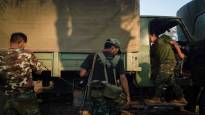Myanmar’s military is arresting, torturing and killing dissidents indiscriminately while the world’s attention is elsewhere.
Three years of military rule has led to unbearable brutality in Myanmar, and people are living a never-ending nightmare, says the UN High Commissioner for Human Rights Volker Türk.
According to him, the military junta crushes any kind of dissent without any punishment, the spotlight of world politics aside.
The junta came to power in February 2021 when it ousted Aung San Suu Kyi democratically elected government.
The junta is opposed by ethnic rebel groups and the People’s Defense Forces movement, which demands democracy. The conflict has spread to every corner of the country, said Türk while speaking at the UN Human Rights Council.
More than 20,000 opponents of the junta are in prison
According to Türk, credible sources have confirmed that the army has killed more than 4,600 civilians in three years. 490 of them were children.
– The real number is almost certainly much higher, Türk said.
The violence has intensified since the end of October. At the time, armed ethnic groups launched coordinated attacks, prompting reprisals from the military. The army has, among other things, carried out airstrikes on cities.
In January, it was confirmed that 232 civilians died in the violence and 145 of them died in airstrikes.
Türk says that the army also recruits people by force and threats.
More than 20,000 opponents of the army are detained.
– People are afraid that they can be arrested for any reason and at any time, Türk said.
According to information received by the Human Rights Commission, political prisoners are systematically tortured in prisons, police stations and military interrogation centers. Many have died from their injuries because they were denied treatment.
In total, more than 1,600 detainees have died, in January 48 alone.
Separately, Türk mentioned the Rohingya minority, which has been the target of discrimination and serious human rights violations for decades. Myanmar does not grant them citizenship and they are not allowed to move freely from their villages. More than a million Myanmar Rohingya live in refugee camps in neighboring Bangladesh.
Türk calls on the international community to intervene in Myanmar’s human rights violations, for example by banning the export of weapons, jet fuel and foreign currency to the country.
Sources: AFP, Uutiset
